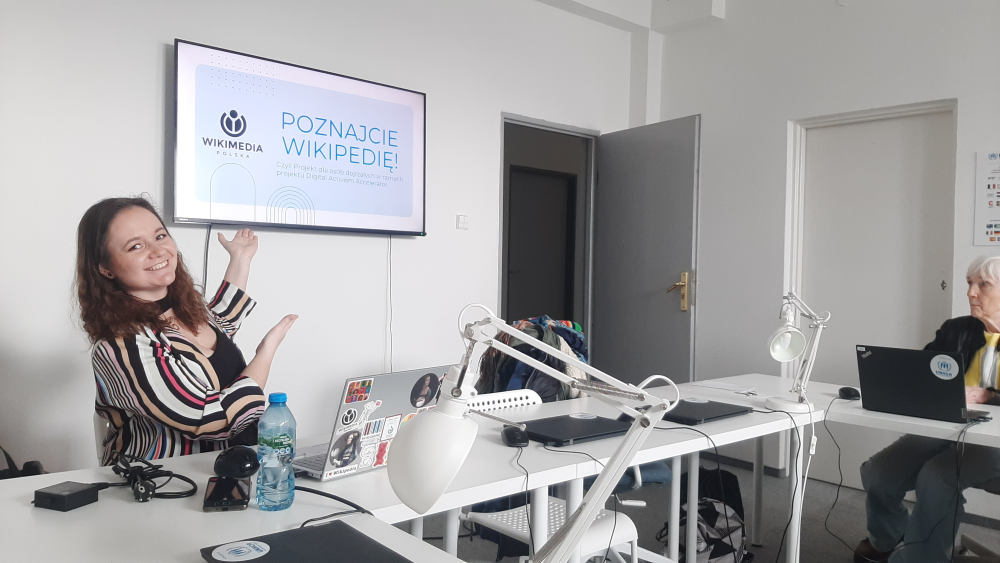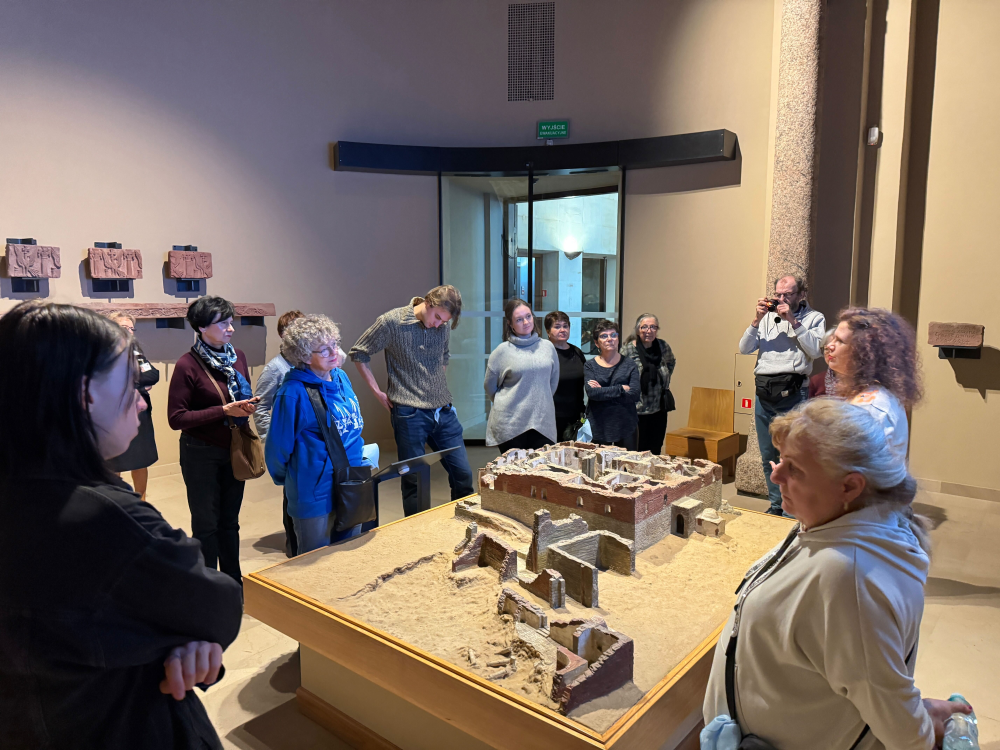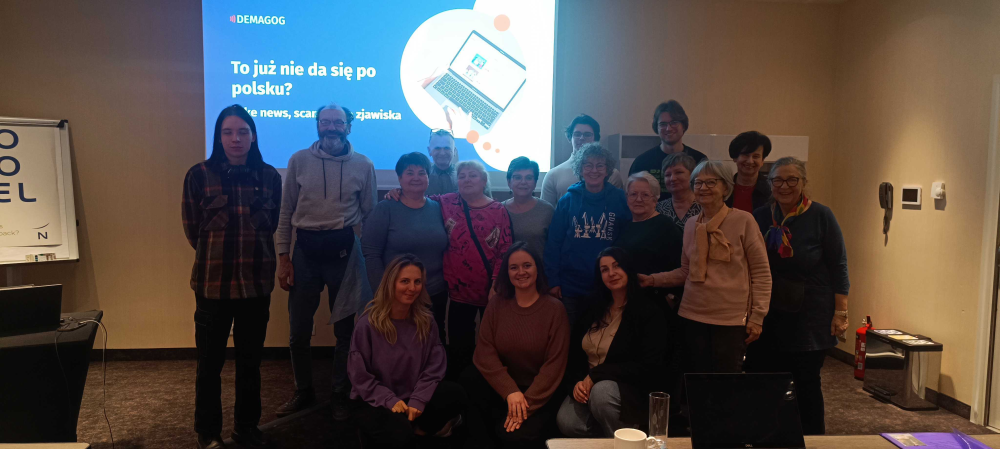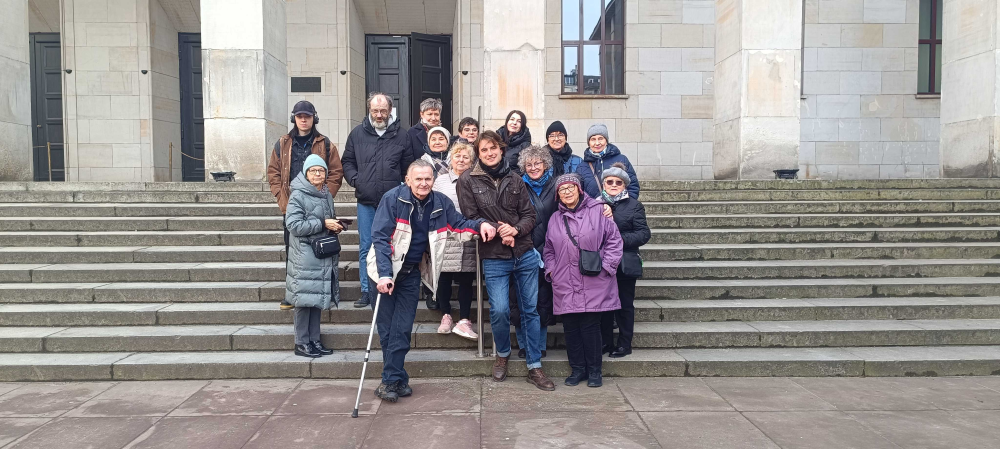The Local Action activities began with an online training session on nonviolent communication, conducted by the Culture Shock Foundation in January 2025. This training was aimed at experienced Wikipedia editors, who would, in the later stages, support new participants, primarily older individuals, during their initial experiences on Wikipedia. The training emphasized intergenerational communication, helping Wikipedians build relationships based on empathy and understanding.
The next phase included in-person workshops utilizing the Wikimedia Academy, an educational platform that promotes learning through gamification. These workshops took place in Gdańsk in February at the Neighborhood House “Gościnna Przystań” organized by the Gdańsk Foundation for Social Innovation, and in Lublin at the Tu Obok Foundation's headquarters. These practical training sessions focused on familiarizing participants with the basics of how Wikipedia operates and how to use the educational platform effectively. Participants learned how to search for information, recognize reliable sources, and report errors in articles. For many, this was their first exposure to the concept of open knowledge and the co-creation of content online.
 Training in Lublin, source: Tu Obok Foundation
Training in Lublin, source: Tu Obok Foundation
The culmination of the activities was a series of workshops held in Warsaw in March 2025. These workshops focused on discussions about Wikipedia, media education, and strategies for combating disinformation. On the first day, participants visited the National Museum in Warsaw, where they learned about the museum's collaboration with the Wikimedia Polska Association. They explored how to incorporate Wikipedia's sister projects, such as Wikimedia Commons and Wikisource, into the activities of cultural institutions.
 Workshop in Warsaw, photo: Wioletta Matusiak
Workshop in Warsaw, photo: Wioletta Matusiak
The second day featured lectures and workshops conducted by the Demagog Association, focusing on how to recognize fake news, scams, and develop good internet habits. Participants reported a significant impact from the workshops, indicating in surveys that they now have a better understanding of disinformation and how to combat it.
As a result, the entire training cycle not only introduced participants to the mechanisms of Wikipedia but also encouraged them to co-create knowledge resources and increased their digital awareness. For many attendees, it was a moment of empowerment — gaining the sense that they had valuable contributions to make in the online space.
Challenges encountered on the way
During the implementation of the Local Action, several significant challenges arose that affected our approach and required flexibility in how we engaged with participants and structured our work.
The most substantial challenge was the varying levels of digital competence among the participants. Skills related to operating a computer, logging into email, and using online platforms were highly uneven, ranging from advanced to very basic. Initially, we assumed that participants would be able to navigate the Wikimedia Academy independently. However, after consultations, it became clear that additional support and guidance were necessary. As a result, we organized in-person meetings, where participants could receive assistance from instructors.
The classes were tailored to meet the needs of the group, incorporating elements of pair work and collaborative problem-solving, which significantly increased participant engagement and fostered cooperation. We also encountered issues with concentration and task-focused work. Participants required more time to absorb information than we had initially anticipated, prompting us to adjust the pace of our instruction to better suit their abilities. Moving forward, it would be beneficial to establish clearer recruitment criteria and more precisely define the types of support needed based on the group’s needs.
A key conclusion from the implementation was the necessity to more deeply consider the principles of andragogy. Those leading classes for senior groups should possess an understanding of this demographic's needs, capabilities, and ways of learning. It is essential to adapt both the content and instructional methods to align with the group's characteristics.
Another important finding was that the senior group is not homogeneous. Participants varied not only in age but also in experience, learning styles, and levels of social engagement. This diversity raises important questions about how to design educational activities that are inclusive and considerate of these differences.
To address the identified challenges, several improvements were implemented: the training duration was extended, and participants received technological support from a dedicated individual who assisted them in using digital tools. These changes significantly enhanced the participants' comfort and facilitated a more thorough understanding of the provided content.
Celebrating milestones and their significance
The training provided mature individuals with the opportunity to develop digital competencies and understand the principles of Wikipedia. Participants learned essential skills related to recognizing reliable sources, verifying information, and reporting inaccuracies in encyclopedia entries.
An important outcome of the training was the increased awareness of digital threats, alongside the development of skills to counteract disinformation. During the in-person workshops held in Warsaw, participants explored the mechanisms behind the spread of fake news and gained practical tools for recognizing manipulation and ensuring information security. The sessions, led by an expert from the Demagog Association, received high praise from participants, who found them useful for everyday internet use.
 Workshop by Demagog Association, photo: Damian Kujawa
Workshop by Demagog Association, photo: Damian Kujawa
The initiative also fostered a space for integration and the sharing of experiences. For many participants, these meetings provided opportunities to build relationships, learn collaboratively, and enhance their sense of empowerment. Engaging with socially active individuals means the knowledge gained from this training has the potential to be shared further within local, family, and neighborhood contexts.
From the perspective of the Wikimedia Polska Association team, a significant achievement was reaching groups that had previously been overlooked by the organization's initiatives. At the same time, the training improved the Wikipedia editor community's competencies in intergenerational communication. Thanks to sessions conducted by the Culture Shock Foundation, editors gained a better understanding of older individuals' needs, allowing them to tailor their activities to suit the capabilities and expectations of this demographic.
In summary, the Local Action not only enhanced the participants' skills but also decreased their feelings of digital and informational exclusion. It served as a catalyst for further social and digital engagement, demonstrating that mature individuals possess valuable resources and knowledge that can significantly contribute to the open Internet space.
Technologies and tools behind the Local Action
The main technological tool used was the Wikimedia Academy, an educational platform designed using gamification principles. This platform was developed by the Wikimedia Polska Association in collaboration with Grow Uperion. It serves as a digital course that introduces users to the principles of editing Wikipedia and the basics of creating neutral and reliable knowledge in an online environment.
Through interactive tasks, users learned how to navigate Wikipedia, recognize credible sources of information, report errors in articles, and understand the fundamental principles of publishing content. The Academy not only functioned as a training resource but also initiated discussions about adopting a critical approach to information and fostering digital engagement.
During workshops in Warsaw, participants utilized fact-checking tools presented by an expert from the Demagog Association. They learned how to verify online information, identify common patterns of disinformation, and develop good habits for Internet usage. Additionally, they were taught the basic principles of working with search engines, source databases, and tools for assessing the credibility of content.
In this context, technology served a dual purpose: it was both an educational tool and a subject of education. Participants not only utilized digital solutions but also learned to understand, evaluate, and consciously apply them in their everyday lives.
 Meeting in Warsaw, photo: Ada Jakubowska
Meeting in Warsaw, photo: Ada Jakubowska
Key takeaways
Activities targeting the 60+ age group hold significant potential, particularly given the increasing number and importance of this demographic in society. In the long term, collaboration with older adults can serve as a strategic direction for developing educational programs and fostering social engagement.
Our Local Action led to two key conclusions:
First, the senior group is not homogeneous. Participants varied in their digital skills, learning styles, health status, social experience, and motivation. Therefore, when planning activities for older adults, it is essential to consider the diverse needs and capabilities of this group — both in terms of content and methodology. A one-size-fits-all approach is ineffective; successful education requires individualization and flexibility.
Second, partnering with organizations experienced in working with older adults is crucial. Collaborating with entities such as the Gdańsk Foundation for Social Innovation and the Tu Obok Foundation significantly enhanced the effectiveness of our activities. It streamlined the organizational and logistical processes and built trust between the organizers and participants. Local partners not only help reach the appropriate audience but also create a safe and familiar learning environment.
The initiative also highlighted the importance of equipping participants with tools to not only use information but also to co-create, disseminate, and verify it consciously. By combining elements of digital, media, and social education into a cohesive program, we created conditions conducive to meaningful changes in the attitudes and practices of participants in their everyday lives.
Taking steps towards digital transformation
Working with groups of mature individuals is highly rewarding. The focus and interest within this group are significant, and their willingness to engage is paramount to the success of the organization’s mission and the strengthening of the values we uphold in society.
The ultimate goal of disinformation and similar activities is to promote social disintegration, increase distrust, and break local connections. The message often is to "trust no one" and to avoid getting involved. In contrast, the Digital Activism Program encourages collaboration among organizations and their communities. Through this program, we connect, build relationships, and share knowledge, making it an extremely valuable initiative.
Author: Wikimedia Polska Association
Background illustration: Tu Obok Foundation